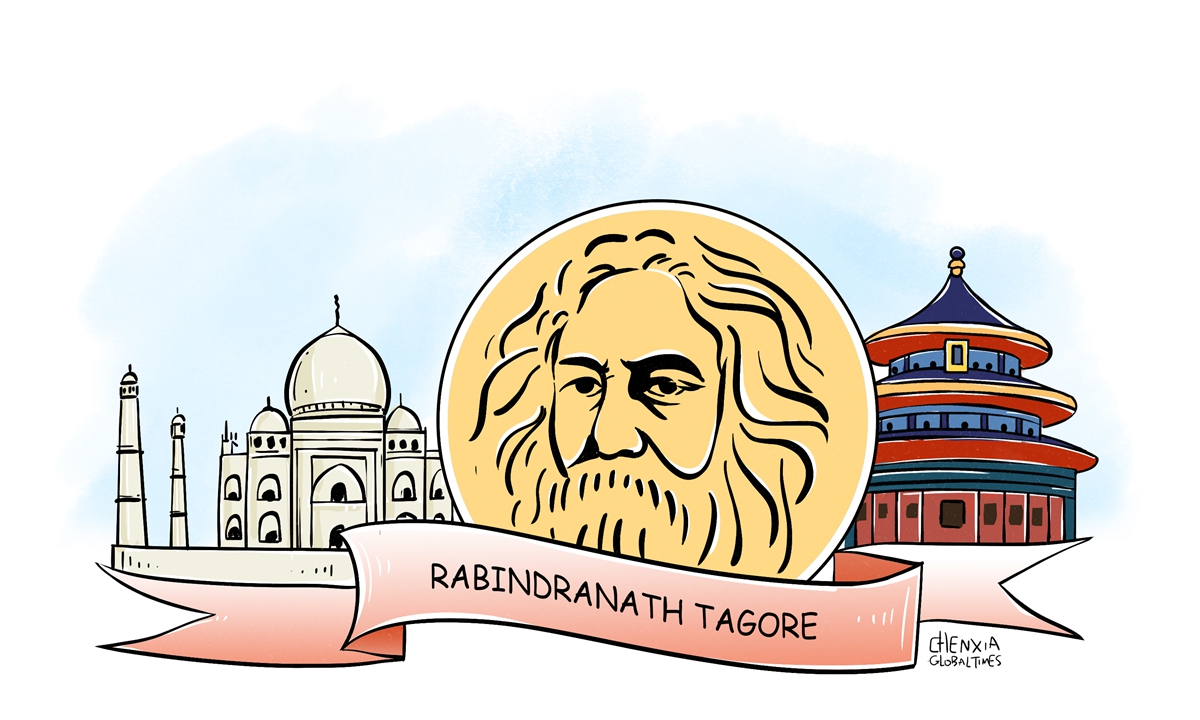
Illustration: Chen Xia/GT
It was barely my second month in China. Everything was new, and I was still trying to grasp the rhythms and nuances of this unfamiliar country. Over the weekend, a colleague invited me to a cafe to join a group of Chinese university freshmen for an informal English corner. The idea was simple yet intriguing: to have casual conversations that would help the students practice their spoken English while allowing expats like me to socialize and make new friends.
As we began with the usual round of introductions, one student, upon learning that I was originally from India, exclaimed with excitement, "It's so cool to know you are from India. I love 'tiger.' Do you also love his work?" Fresh to the country and the culture, I was puzzled by his reference to "tiger." It was only when he showed me a photo that I realized he was talking about Rabindranath Tagore, the great literary polymath. Due to the Chinese pinyin
Taige'er, he had pronounced Tagore as "tiger."
After residing in China for over eight years now, a place that has truly become my second home, I've grown to understand the profound reverence for Tagore here and his enduring relevance to India-China cultural exchanges.
This year marks the 100th anniversary of Tagore's first visit to China, and his teachings and relationship with the country have only grown more significant. In today's world, marked by deep divides, polarization and geopolitical challenges, Tagore's legacy serves as a bridge, fostering understanding and mutual respect between India and China.
Already a Nobel laureate by the time he visited China in 1924, Tagore embarked on a journey that would lay the foundation for a rich cultural exchange between two ancient civilizations. His visit came at a time when China was undergoing significant political and social transformation. Amidst this backdrop, Tagore's message of universal humanism, spiritual unity, and cultural synthesis resonated deeply with the Chinese intellectuals and artists of the era.
During his lectures and interactions, Tagore emphasized the importance of cultural dialogue and mutual respect. He saw the rich cultural heritage of both India and China as pivotal in fostering global peace and understanding. Tagore's poetry, philosophy, and ideals were embraced by Chinese scholars, and his works were translated into Chinese, further cementing his influence.
Fast forward to the present day, the dynamic between India and China is intricate, characterized by a mix of cooperation and contention. Geopolitical tensions, border disputes and economic rivalries frequently grab headlines. Nevertheless, cultural diplomacy stands out as a potent means to bridge divides and nurture mutual understanding among nations, with Tagore's legacy serving as a testament to the lasting influence of cultural ties.
In contemporary times, Tagore's philosophy of mutual respect and cultural exchange is more relevant than ever. His belief in the intrinsic value of different cultures and his efforts to promote dialogue can help navigate the intricacies of modern India-China relations. By revisiting Tagore's contributions, both nations can find common ground in their shared cultural heritage.
Tagore's influence in China extends beyond literature, penetrating the realm of philosophy and education. Xu Zhimo, a renowned poet, translated many of Tagore's works and actively promoted his ideas. This intellectual exchange enriched Chinese literature and opened new avenues for philosophical discourse.
Besides this, Tagore's holistic approach to education, which integrates arts, humanities and sciences, resonates with contemporary educational reforms aiming to produce well-rounded global citizens. In today's globalized world, where divisive politics and cultural misunderstandings often overshadow dialogue, Tagore's vision offers a beacon of hope. His advocacy for cultural understanding and cooperation is a reminder of the potential for harmony between India and China.
This 100th anniversary of Tagore's visit to China can be deemed a poignant reaffirmation of the enduring principles he championed. It offers an opportunity to revisit his teachings and apply them to contemporary issues. Academic exchanges, cultural festivals, and joint literary initiatives inspired by Tagore's legacy can serve as platforms for deeper engagement between the two nations.
Engaging the youth in both countries is crucial for sustaining Tagore's legacy. Educational programs that promote the study of Tagore's works can help cultivate a new generation of thinkers who appreciate the shared cultural heritage of India and China. Universities and cultural institutions can also play a crucial role in keeping the spirit of Tagore's vision alive, thus, laying the groundwork for future collaborations.
Tagore's legacy is a powerful reminder of the potential for cultural diplomacy to bridge divides and foster mutual respect. His teachings continue to inspire and offer valuable lessons for navigating the complexities of modern bilateral relations.
In an era rife with geopolitical tensions, Tagore's vision of universal humanism and cultural synthesis shines as a guiding beacon. By embracing his legacy, India and China can certainly strengthen their ties and pave the way for a more harmonious tomorrow, thereby building a community with a shared future for all of humanity.
Looking back on Tagore's journey, let us also look ahead, drawing inspiration from his ideals, toward a world where cultural exchange and mutual respect underpin international relations.
The author is a media professional based in Beijing. life@globaltimes.com.cn




